Richard Maurer, ND
Nutritionally oriented health care practitioners have long touted fish as one of the healthiest dietary staples. French researchers now report another possible reason for the protective effects of a diet emphasizing fish. Past research has confirmed the protective effect of fish consumption is related to the increased intake of omega-3 fatty acids. The current study on 9758 men aged 50-59 shows an additional trend with increase fish intake, slowed heart rate. This trend was minor, but slowed by 0.5 beats per minute with each increase in fish consumption (<1/week; 1/week; 2/week; >2/week).
Besides offering a new mechanism for protection from omega-3 fatty acids, this study also confirms and adds to the growing body of cardio-protective effects from dietary intake fish. With each increase in weekly fish intake, researchers found a decrease in triglycerides, decreased systolic and diastolic blood pressure, as well as increases in high-density lipoprotein cholesterol compared with no consumption of fish.
Which omega-3 fatty acid was responsible? Both.
The omega-3 fatty acids EPA and DHA both appeared to have separate but complementary activity. Higher DHA levels, as measured using RBC analysis, were associated with a decrease in diastolic blood pressure. Whereas higher EPA blood levels were associated with the decrease in triglycerides.
Researchers and clinicians have been convinced that several complementary mechanisms were responsible for the cardio protective effects of fish intake. This study provides yet more evidence to recommend fish as an important part of one’s diet to help reduce the risk of death from CHD.
Dallongeville J, Yamell J, Ducimetière P, et al. Fish consumption is associated with lower heart rates. Circulation. 2003;108:820-825.










 Master PCMH Criteria with Upcoming Webinars
Master PCMH Criteria with Upcoming Webinars







 The American Osteopathic Association (AOA) is the representative organization for the over 70,000 osteopathic physicians (DOs) and 18,000 osteopathic medical students in the United States. The organization promotes public health, encourages scientific research, serves as the primary certifying body...
The American Osteopathic Association (AOA) is the representative organization for the over 70,000 osteopathic physicians (DOs) and 18,000 osteopathic medical students in the United States. The organization promotes public health, encourages scientific research, serves as the primary certifying body...










 9:46
9:46
 Daniel Enriquez de Guevara
Daniel Enriquez de Guevara














.jpg)


















0 comentarios:
Publicar un comentario